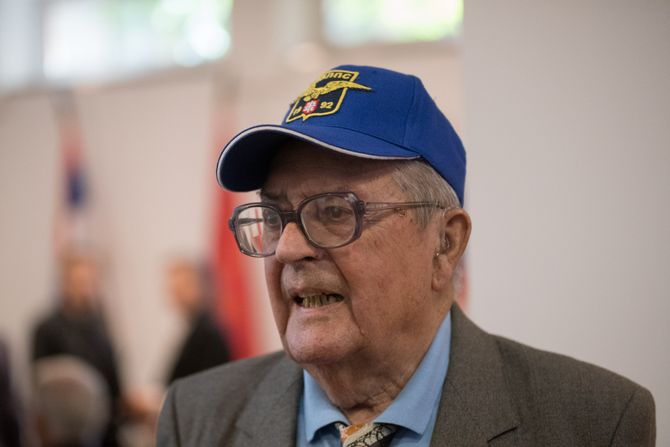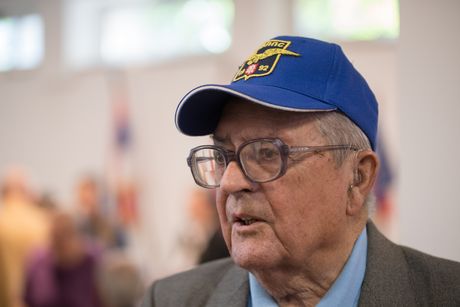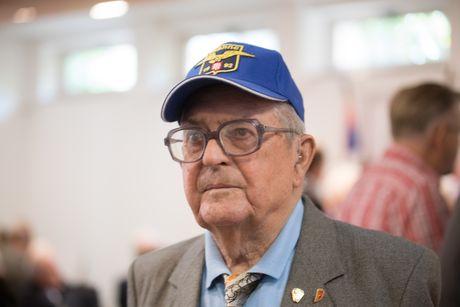
Ljuba was liberating Dorcol with the red flag as a 17-year-old. He lost 52 comrades that day
Belgrade this year marks 75 years since the liberation in the Second World War, when on October 20, 1944, the 1,287-day German occupation of the capital of then Yugoslavia ended.
2,953 members of the National Liberation Army of Yugoslavia (NOVJ) and 976 members of the Red Army were killed in the battle for the liberation of the Serbian capital - and many more during the entire operation.
One of the surviving participants in the big event is 93-year-old Ljubisa Antonijevic, who joined the 1st Proletarian Division's 3rd Krajina Brigade two days before the liberation of Belgrade and seven days after his 17th birthday.
Due to his small build, the older and more experienced fighters nicknamed him Maci.
The battle for the liberation of Belgrade was his first baptism of fire, but he says he wasn't afraid because older and more experienced fighters advised and protected him.

"Corporal Vojo Subotic, who died in Zagreb on the last day of the war, accepted me into the brigade. He said to me, 'Maci, just watch what I do and how I behave, imitate me and don't worry about anything'. And so I did," Antonijevic tells Tanjug, remembering the most striking details.
He will never forget the fierce clashes, including the one for the liberation of the Belgrade neighborhood of Dorcol, during which 52 of his comrades were killed, and the scenes of fireworks and joy in the streets that erupted in the evening in the liberated city.
"There was shooting everywhere. Anyone who had something to shoot from - rejoiced. People were in the streets...," Antonijevic recalls.
And in the morning, he remembers, they made the final assault on Kalemegdan and brought the victory flag to the Dizdar Tower.
"The flag was red, proletarian, like the one on the Reichstag, only smaller. We waved the flag for five, six minutes and at that time we weren't even aware of what we were doing, but we wanted to show that we had liberated Kalemegdan," he remembers vividly.
He says he didn't know at the time that this was the precise spot where, on October 6-7, 1915, in the fight to defend Belgrade against the Austrian army the entire battalion led by famed Major Gavrilovic lost their lives.
"So, without knowing it, we were practically the avengers of that battalion, and in that way I paid my respects to my grandfather, who died in (the Battle of) Kolubara in 1915," Antonijevic says.
He has been talking with students in the Dorcol schools for about ten years now, telling them about those glorious days, and says that out of his entire battalion, he is the only one still on his feet, and only one of the two who are still alive.

"We used to go to schools in larger groups, but now I'm the only one who does it," says Antonijevic, whose stories about the liberation of Belgrade are best liked by his great-grandchildren.
The battle for the liberation of Belgrade is one of the largest and most significant battles of the Second World War in the Balkans. It lasted from October 12 to October 20, 1944, and was a part of a comprehensive operational plan, continuing without interruption in eastern Serbia, and continuing the pursuit of the enemy through Srem, northern Serbia.
The combined units of the NOVJ and the Red Army inflicted a heavy defeat on the Germans during this operation, liberating Belgrade, the capital of Yugoslavia, and much of Serbia.
To mark the 75th anniversary of the liberation of Belgrade, a series of events will be organized, including the visit of Russian Prime Minister Dmitry Medvedev, who is arriving in Serbia on Saturday.
Video: Today is 75 years since the Allies stopped the Nazis
(Telegraf.rs/ Tanjug)
Video: Jovana Stojiljković o seriji "Senke nad Balkanom 3"
Telegraf.rs zadržava sva prava nad sadržajem. Za preuzimanje sadržaja pogledajte uputstva na stranici Uslovi korišćenja.

